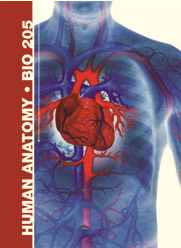 |
Tamatha
Barbeau, Ph.D. Associate Professor of Biology Coordinator: Veterinary Studies Program Coordinator: Program for Undergraduate Research (PURE) |
|
Human
Anatomy Lecture (205) Syllabus
|
|
Instructor: Tamatha
Barbeau, Ph.D. |
 Lecture Textbook: Human Anatomy, 3e by McKinley and O'Loughlin ISBN 0077625943 DIRECT LINK FOR PURCHASING BOOK FROM MCGRAW-HILL: http://www.mhprofessional.com/mhhe_product.php?isbn=0077625943&cat=108 This textbook has been CUSTOMIZED. This means that as an instructor I have customized the textbook to contain only the chapters that we will be covering in my course. Some (approximately 4) chapters that come with the regular textbook have been omitted from this custom published book. Textbook Companion Website (Supplemental, but NOT required) http://highered.mcgraw-hill.com/classware/infoCenter.do?isbn=0072965495 |
COURSE DESCRIPTION: In this course we will investigate basic human anatomy covering aspects of the 11 major organ systems. This course is appropriate for students in medical technology, pre-nursing, pre-medicine, and related allied health programs. The course is taught in the systemic method meaning that each of the 11 major organ systems is covered one at a time. The course involves A LOT of memorization so be prepared to study! You should spend about 1-3 hours outside of lecture studying for each hour in lecture that material is covered. Keep up with your reading of the textbook and review of lecture notes frequently.
CONDUCT OF THE COURSE: This course will consist of two 75-minute lectures per week and one 3-hour lab. Be prepared for in-class discussions and laboratory activities by reading the assigned material prior to class. Students will be evaluated by their performance on lecture exams and quizzes, and on laboratory work and practicals. There are 4 exams in the semester, which are based on material covered in each quarter of the course; thus, exams are not comprehensive. Attendance of both the lecture and the laboratories is mandatory. Notification of the instructor prior to an absence is strongly recommended, and absences are excused only for valid reasons (e.g. medical or legal reasons, or emergencies).
COURSE
OBJECTIVES: After completion
of this course, the student will be able to:
1. recognize and describe the anatomical systems within the body;
2. outline the different organizational levels from the cell, the tissue,
the organ, and the organ system.
3. perform anatomical exams, animal dissection, and describe and record your
findings;
4. work collaboratively as well as independently.
STUDENT PERFORMANCE: In this course performance is assessed based on percentage of total possible points as shown below. The lab is worth 25% of the course. There are no extra credit assignments in this course, so every quiz, exam, and practical counts!
|
Number
|
Points
|
Total
|
|
| Lecture Exams |
4
|
160
|
640
|
| Lecture Quizzes |
3
|
40
|
120
|
| Lab Practicals |
4
|
60
|
240
|
| Total |
1000
|
| Grading Scale | 90 - 100% A | 77 - 79% C+ | 60 - 66% D |
| 87 - 89% B+ | 70 - 76% C | < 60% F | |
| 80 - 86% B | 67 - 69% D+ |
LECTURE
EXAMS: There
are 4 exams during the semester, based on material from each quarter of the
course, and they consist of mostly multiply choice with some short answer
questions. Attendance at exams is mandatory. Make-up exams will be given only
to students with documented excuses for an absence, and make-up exams will
include fill-in-the-blank and short answer questions. If you miss an exam
you must provide me with an official excuse and take a make-up exam within
2 days. Failure to do so results in a zero for that exam. There will be
no exceptions to this rule. The final exam time and location is given by the
Course Schedule. You must take your final exam when it is scheduled, and there
will be no exceptions and no makeup final exam unless you have a verifiable
emergency. If you have multiple exams on that day (2 or even 3 exams) you
simply must budget your time wisely and start studying well ahead of schedule.
LECTURE
QUIZZES : There are 3 lecture
quizzes during the semester consisting of 20 questions given during the first
15 min of lecture. Quizzes contain multiple choice, fill-in-the-blanks, and
matching questions. If you come late to lecture on these days you do not take
the quiz. If you miss a quiz, or arrive late on the day of a quiz, you must
provide an official excuse and make-up the quiz within 2 days or else
you receive a zero. There will be no exceptions to this rule.
ATTENDENCE:
There are no points given for attendance but attendance is recorded throughout
the semester. If you arrive to class late you will not be allowed to sign
the attendance roll. Students that attend lecture regularly tend to do better
in the course. I often present material during lecture that is not found in
the textbook.
LECTURE SCHEDULE:
The following is a tentative lecture schedule of the subject
material, exam, and quiz dates for Summer II.
|
Dates
|
Topic
|
Chapters
|
| May 30-31 | Organ systems, anatomical planes, regions, & cavities, and surface anaotmy | 1, 13 |
| Jun 4-5 | Skeletal System / Quiz 1 Jun 4th | 6, 7, 8, 9 |
| Jun 6 | Muscular System | 10, 11, 12 |
| Jun 7 | Exam 1 (Ch 6, 7, 8, 9, 10) | |
| Jun 11 | Muscular System | 10, 11, 12 |
| Jun 12-13 | Nervous System / Quiz 2 | 14, 15, 16 |
| Jun 14 | Exam 2 (Ch 11, 12, 14, 15,16) | |
| Jun 18-19 | Endocrine, Cardiovascular, & Vascular Systems | 20, 22, 23 |
| Jun 20 | Digestive System | 26 |
| Jun 21 | Exam 3 (Ch 20, 22, 23, 26) | |
| Jun 25-26 | Urinary System | 27 |
| Jun 27, 28, Jul 1 | Reproductive System / Quiz 3 | 28 |
| Jul 3rd | Exam 4 (Ch 27, 28) |